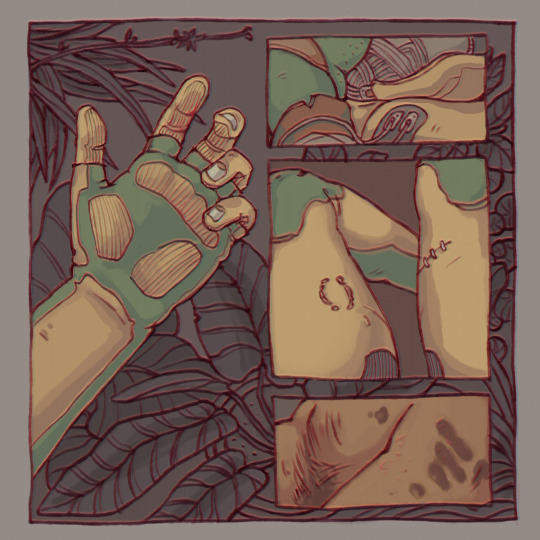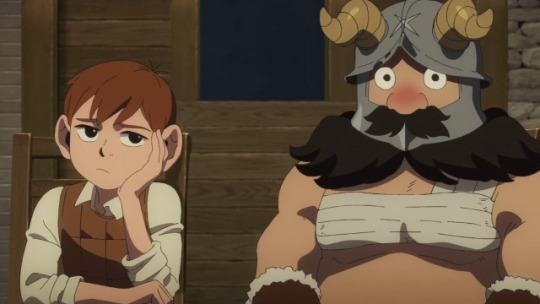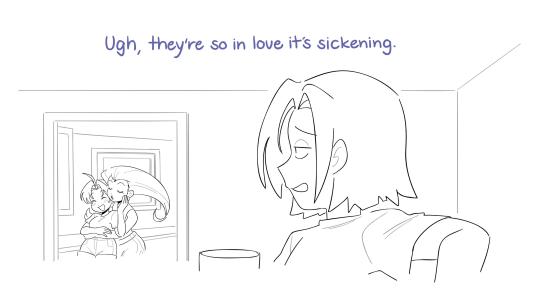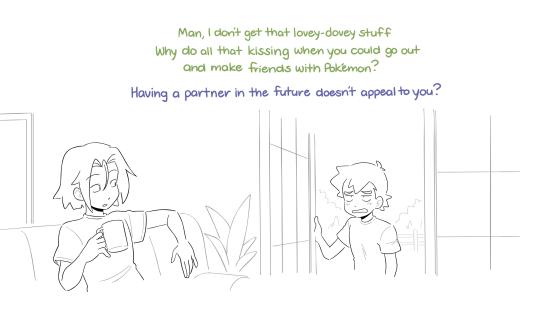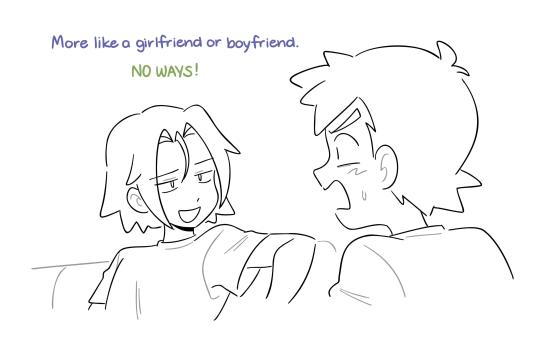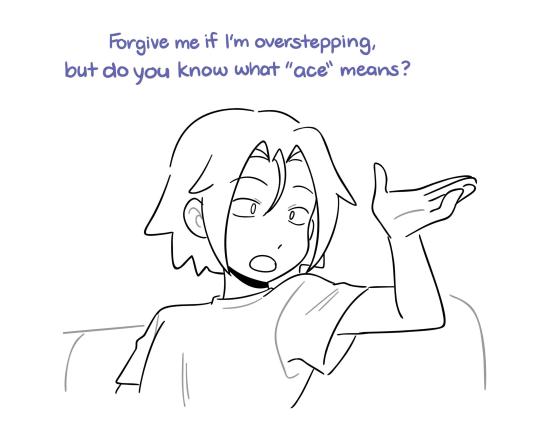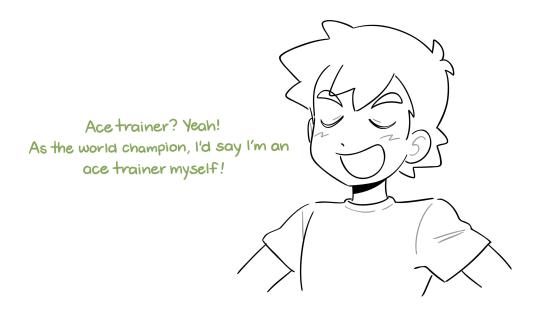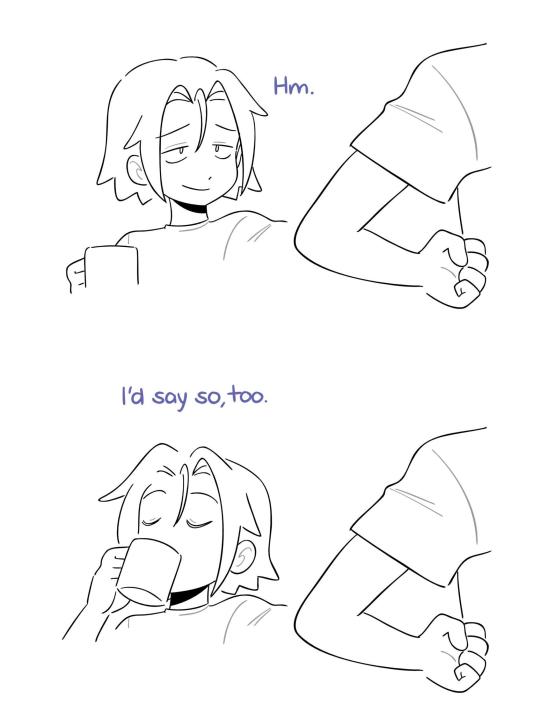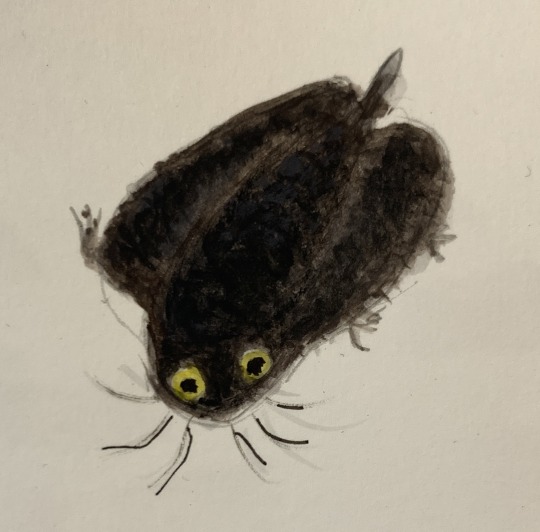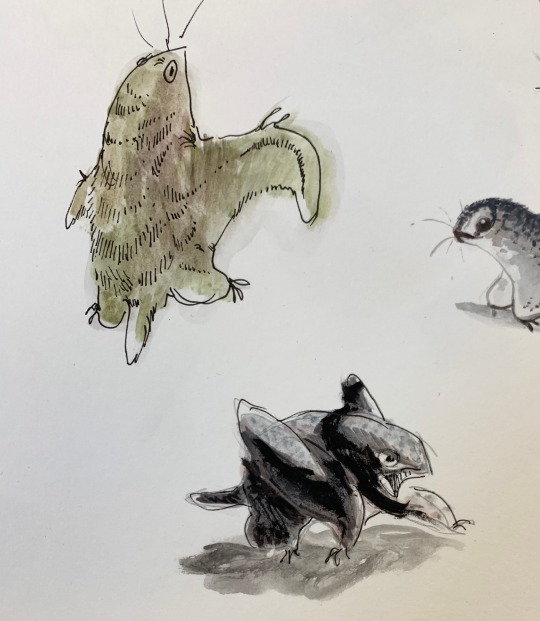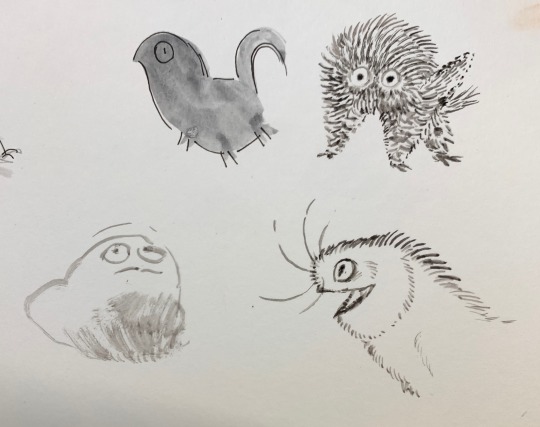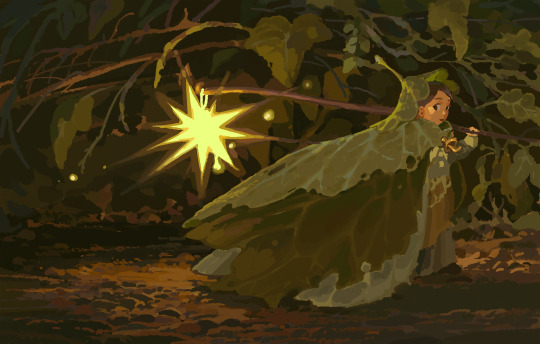Text
Introduction to the OSR
what's an OSR? it's a game that's kinda like old-school D&D. or is old-school D&D. or is compatible with old-school D&D. an OSR game generally has some or all of the following principles:
low character power with highly lethal combat. in old-school D&D a 1st-level fighter has d8 hit points and a longsword does d8 damage, and you die at 0HP. this is not to ensure characters die all the time but to emphasize the next bullet point:
emphasis on creative problem solving. most situations cannot be solved by straightforward use of your abilities (such as charging into every situation with swords drawn, if a fighter), so the game tests lateral, outside-the-box thinking.
emphasis on diegetic progression. spells are found, not obtained automatically on level-up. you get XP by finding gold more than killing monsters. most of your cool abilities come from magic items. making alliances & hiring followers is encouraged.
focus on managing inventory, resources, risk, and time. the players are constantly faced with meaningful decisions; this is the heart of the game.
very sandbox-oriented. the focus on creative problem solving means the game must be accommodating to players taking a course of action the GM didn't plan for. use lots of random tables to generate emergent story. some elements of new simulationism.
high tactical transparency, i.e., the optimal course of action is rarely system-specific, and ideally very possible for a new player to intuit.
usually semi-compatible with old D&D, but not always. usually rules-lite, but not always.
what does the OSR mostly NOT do?
focus on character builds. these change the focus too much to be on the rules than the fiction, can create situations where stuff everyone should be able to do is an ability locked to one class, and impede tactical transparency.
resolve everything with a die roll. combat uses dice to be scary, unpredictable and most importantly not your default course of action. everything else should bring up dice rarely - dice are your plan B when your plan A fails. the best plans need no dice.
use linear storytelling or put players into a writer/GM role. linear storytelling gets in the way of the decision-making so core to the playstyle; letting players write details into the setting is mutually exclusive with them discovering it.
rules for everything. 400 pages of crunch is worse at simulating a believable world than the GM and players' shared understanding. OSR games rely constantly on GM ruling.
mostly still applies to all the above. making your system a "pure" OSR game comes second to doing what's best for your game.
System recommendations
old D&D or a retroclone
old-school D&D - or old school essentials or basic fantasy or swords & wizardry, which are old D&D's mechanics repackaged with quality-of-life tweaks (and the upside of not giving WOTC your money) - are usually the go-to when recommending someone's first OSR game. they're actually not my first pick, though!
PROS:
very complete, with more robust rules than a lot of the lighter games on this list.
100% compatibility: most OSR adventures are statted for old school essentials. converting them to other OSR systems is usually simple, but not 1-for-1.
easier to find games for. anyone interested in the OSR space knows what old school essentials is.
CONS:
jank. these games largely still have weird saves, level limits for non-humans, some still have descending AC, etc etc. it's not that bad but it is there
i hate thief skills. lots of essential dungeoneering actions are locked to the thief class as abilities, with abysmally low success chances. this is stuff i prefer being handled without a roll. thieves in this system suck and make everyone else worse at dungeon crawling by existing.
there's just lots of really cool shit in other systems i'm about to go into that you just don't get here
Knave 1e and its various hacks
this is a 7-page super-lightweight system that boils everything down to just the essentials.
rolling a character takes like 5 minutes. roll stats, roll gear, roll traits, go. done. it's great.
characters are defined entirely by stats and gear, no classes. wanna be a fighter, have high strength and carry a big sword and armor. wanna be a wizard, have high intelligence and fill your inventory with spells. item slots are elegant and pretty limited.
initiative is instant: roll d6. 1-3, monsters go first. 4-6, PCs go first. swingy, but god it is so smooth and shaves like the most boring 5 minutes off of every combat
monsters are so very elegant. old D&D gives monsters a "hit dice" rating to determine their HP, e.g. a 3HD monster rolls 3d8 for hit points. knave takes this number (HD) and uses it for attack rolls and saves (aside from exceptionally bad/good saves), so a knave statblock looks something like this.
spells are all one or two sentences long & extremely easy to remember.
7 pages is so light. i have the system basically memorized.
DOWNSIDES: there's no dungeon crawling rules (standard for meatier OSR games & something i consider essential) and no real bestiary, though the second point isn't a huge deal cause they're so easy to make. it also kinda assumes you already know how to run OSR games, so there's very little real advice or guidance.
KNAVE HACKS
knave 1e is in creative commons & comes with an editable word doc for you to publish with modifications, so there's a ton of variants (there was a spreadsheet of them somewhere, but i can't find it).
Grave is a favorite - i'm two years into a grave campaign and it's fantastic. it's a dark-souls-y version of knave with some really elegant innovations.
you have a set number of deaths before you for-reals die, as every character plays an undead as is dark souls tradition. makes it good for OSR beginners! being able to tell when you're close to your final death is really good - it lets you emotionally prepare for losing your character & raises the stakes more the more you die. (though honestly you should probably cut the number of extra deaths in half, it's super generous)
XP and gold are combined into one resource, souls. legendary creatures drop big souls you can make into magic items. this has ended up being the coolest thing in my current campaign. my players love finding powerful souls to make into magic items it's so fun
uses preset packages of stats/gear instead of knave's rolled ones, filling the role of more traditional character classes. has the wonderful side effect of not making you get stuck with low stats cause you rolled bad one time.
you have stamina equal to your empty item slots. you spend stamina on spells if you're a caster, or free maneuvers (on top of your attack at no action cost) if you're not. it's super elegant.
there's 3 classes of spells: wizardry for intelligence, holy magic for wisdom, and witch stuff for charisma. nice and intuitive.
there's a page of 50 magic items each a couple sentences long. this PDF is worth it just for the magic items.
DOWNSIDE: see the downsides for knave 1e. all still apply.
i enjoyed grave so much i made a variant of it with the dark souls bits removed (and some dungeon crawl rules added!) to use for my standard fantasy campaigns.
Knave 2e
sadly knave 2e is not purchasable yet (i backed it on kickstarter so i have access, though). but when it comes out i highly recommend it.
much larger and denser than knave 1e. it finally has dungeon crawling rules, it has GM and player guidance, everything is refined and the layout is so so nice and readable.
combat is a bit more interesting than 1e. you can break your weapon against an enemy to deal max damage. you get a free maneuver on high attack rolls.
there's rules for stuff like alchemy, warfare, building a base. it all kicks ass.
there are so many goddamn tables. i rifle through it anytime i need inspiration.
DOWNSIDES: i personally can't think of any! it's a very complete good functional system.
Mausritter
you play tiny little mice! in a world full of big dangerous things that want to eat mice. cat = dragon. you get it. what more could you want
the mouse thing is just super intuitive. you get the dynamic between you and the big scary lethal world. fantastic OSR game to introduce kids
nice and robust ruleset; nothing feels missing
tons of super nice GM stuff! faction rules, tools for rolling up hexcrawls and dungeons, plenty of tables
super clean readable layout. font isn't too small to avoid being intimidating. guidance is really nice and clear.
combat is autohit. super fast & lethal.
100% free
look mausritter is just. good. i wanna run it so bad someday
Worlds Without Number
sort of a middle ground between OSR stuff and 5e.
lots of classes, at least in the paid version. the free version comes with just the warrior, expert and mage. there's feats and more of a focus on builds than most OSR games. if you like more mechanical build variety than a typical OSR game, this is a great game for you!
extremely good multiclassing. y'know how in most games if you just mash together two classes you think are cool you'll end up with a total mess? not here! every combo is viable and works fine! easily the best multiclassing of any game i've touched
an absurd amount of GM stuff and tables. easily more than any of the other stuff i've praised for also having them. but personally i haven't dug into them as much, so i can't really comment on them
skills the way modern D&D has them. you roll dice and try to beat a target number. i don't tend to like rolled skills, but most people do, so if that's your thing WWN has them
DOWNSIDES
the layout is terrible. everything is a huge wall of text with very little use of bold text or bullet points to draw attention to the important bits. the table of contents has like 15 things in it for a 400-page book! i couldn't find any of the paid-version-exclusive classes for like a month after i bought it! looking up rules is a nightmare.
the way the default setting handles "evil races" is like an exaggerated parody of all the problematic aspects of how D&D handles it. like, it wants so bad for you to have an excuse to genocide sentient free-willed people. but at least the default setting is easy to chuck in the trash
Dungeon Crawl Classics
the goal of this system is to take all of the crazy gonzo moments people remember playing old-school D&D in their childhood and turn all of that up to 11 while cutting the stuff that doesn't add to that. i think a lot of its innovations have ended up kind of standard in newer OSR stuff (like fighters getting maneuvers with their attacks), but it still has more to offer.
the funnel: you start the game with four randomly rolled dipshit peasants that you then throw into a meatgrinder to get horribly killed. you pick one of the survivors to be your 1st-level character.
maneuvers: fighters roll an extra die with each attack that gets bigger as you level. if it's a 3 or higher, you get to do a cool thing on top of your attack. pretty standard for OSR games, but this game popularized it!
crit tables: fighters also get more crits and nastier crits as they level. every crit, you roll on the crit table. maybe you chop off a dude's arm. maybe you just knock them over. maybe you shatter their shield. it's very cool
spell tables: i don't really like roll-to-cast mechanics, generally. but DCC goes so all-in on roll-to-cast that it still looks fun as hell to watch. you cast a fireball and maybe it goes how you want. or maybe you explode, or you nuke everything in a half-mile radius, or from now on you permanently ignite flammable materials you touch, or whatever. casters just have to put up with turning into a weird mutated mess across a campaign
there's no dungeon crawl rules, no encumbrance - this game is all about the big over-the-top wacky shit, and is not really interested in the more down-to-earth number crunching. it's more in the you-die-hilariously-all-the-time area of OSR than the you-avoid-death-through-clever-play area. not really my thing but the system knows exactly what it wants to be and i respect it
iron halberd
this one is mine! as the author i'm not qualified to tell you what isn't good about my system, so just assume it's worse than i make it sound, but here's a bunch of the selling points
semi-random character creation where you flip back and forth between rolling dice and getting your own input. roll stats, pick ancestry. pick starting gear kit, roll different dice based on which kit you picked. etc etc. stats are random but all equally viable (no rolling incredibly low or high stats). every time i run this game the character creation is a hit. seriously go roll up a character it'll sell you on the whole thing
you start out a lot stronger than a standard OSR character but grow way more slowly. i don't like 4th-level characters being 4 times as strong as 1st-level ones; HP never gets that high. emphasis is more on diegetic progression instead.
way too many subsystems for alchemy, crafting, strongholds, warfare, renown, rituals, likes 9 pages of magic items, a whole subsystem for becoming a cleric mid-campaign. i couldn't help myself i love this shit
in my current campaign we had a player permanently sacrifice some max HP to become a necromancer after deliberating on whether that's a good idea for like thirty seconds, which instantly made me think my necromancy system is a success
also free
Adventure recommendations
(in rough order of size)
Moonhill Garden (by Emiel Boven): look at this. look at it! this is like the best template for a little dungeon in an OSR game. all of the little factions are tied together. this would be a great oneshot to introduce people to an OSR system with.
A gathering of blades (by Ben Milton): a system-neutral, one-page sandbox. i ran this for an iron halberd game and it went super well. lasted like 7 sessions. highly recommend.
The Waking of Willowby Hall (by Ben Milton): a single dungeon with a million things going on. it's super chaotic with half a dozen different factions crashing into each other and a big angry goose. highly recommend, especially for kids
The Black Wyrm of Brandonsford (by Chance Dudinack): small sandbox with a fun fairytale vibe and a very fleshed-out little town. and a big nasty dragon.
Evils of Illmire (by Zack Wolf): this is a very dense, entire campaign's worth of hexcrawl in a very compact package for like $5. it doesn't do anything particularly new, but the value-for-money is absurd and it's a really good template for how to do a sandbox if you're used to 5e adventures
Ask me anything!
if anything here is unclear or intrigues you, send me asks! i love helping people get into OSR games. i'll link frequently asked questions here if i get any.
312 notes
·
View notes
Text
Announcing: Restful Actions
(It's here. You can go get it now!)
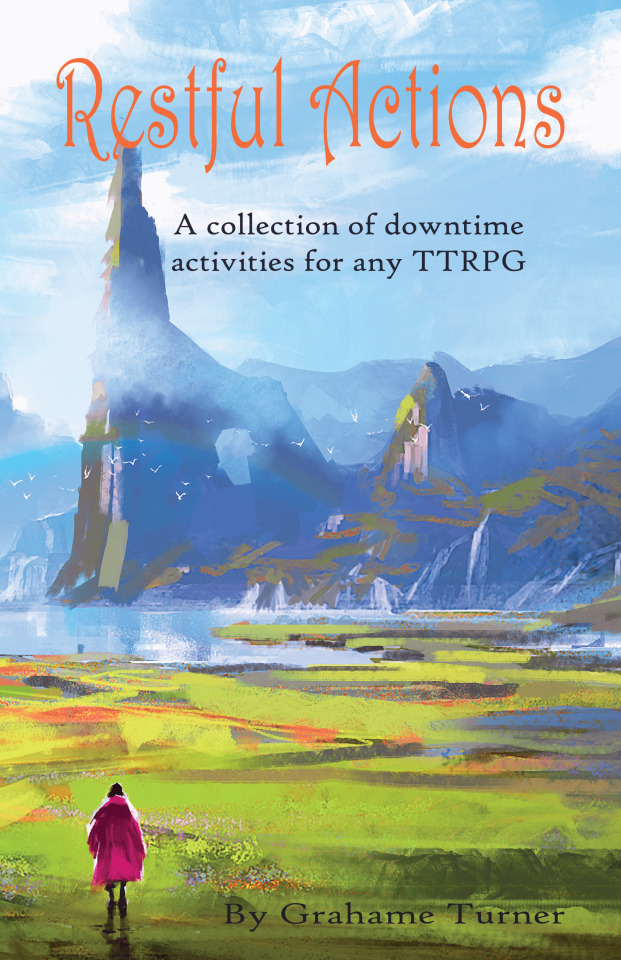
Restful Actions is a collection of 10 minigames for downtime periods in any TTRPG. They're designed to help players resolve character conflicts, complete goals, heal or explore, and take much shorter shopping trips. (You can, in fact, download the shopping trip minigame as a demo!)
For GMs, the goal is to give you a break, so you can start preparing the next Big Event. The minigames invite players to fill in some details of the world, creating shops, landmarks, even creatures.
You can pick up your copy here:
I've talked about this thing in more detail here:
1K notes
·
View notes
Text
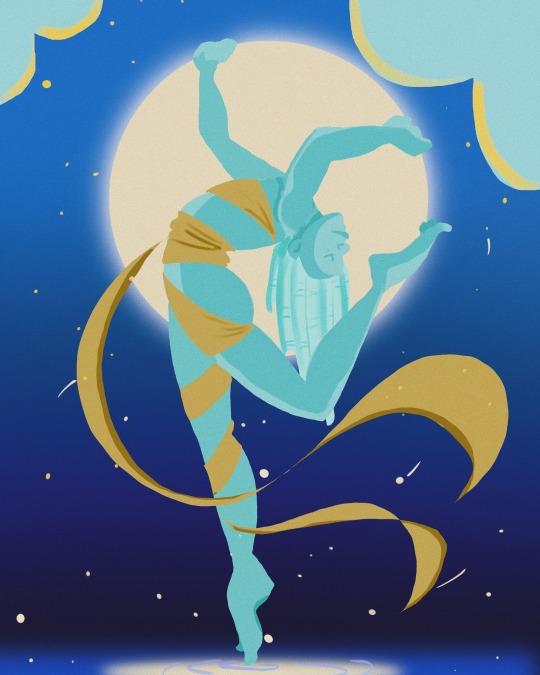
11 notes
·
View notes
Text

Very pleased with this. Put it on the fridge please and thank you.
26 notes
·
View notes
Text
Diceless skills
the more i run and play RPGs, the more i start to be skeptical of dice. i like dice - i like rolling them, i think there's a whole lot of areas where they make a game better. but i'm skeptical about how they're the assumed default for how you resolve stuff.
ramble about ttrpg design under the cut
the way D&D handles skills is simple: you roll a die. if it's a big enough number (modified by the difficulty of the task & how good you are at it) you succeed. if not, you fail (usually meaning nothing happens). what this amounts to is a random chance to fail.
there's storygames that use more nuanced mechanics - no null result! rolling low is less 'total failure' and more that some twist happens. that can be more interesting. (i'm not familiar with a whole lot of storygames, so this is an oversimplification based on my limited knowledge, correct me if i'm wrong)
now these generally work fine for what those games are trying to do. they use uncertainty to generate drama: oh, shit, i failed the super-important deception check to convince the guards i'm a harmless merchant, now the situation escalates. perfectly good mechanic for your standard 5e campaign.
but that kind of stopped working as soon as i branched out into OSR games.
see, dice fill a very different role in an OSR game. these systems are designed with high lethality in mind - your fighter has 1d8 hit points, a sword deals 1d8 damage, you just die at 0HP. if you run them like 5e, you start killing PCs left at right and it can be very demoralizing.
the intended playstyle is, instead, that the players circumvent die rolls through cleverness - once combat starts, your fate is in the hands of the dice, so you make plans that avoid combat or swing the odds so far in your favor that the risk is worth it. so the dice still feel like they fill a good role, making combat deadly and unpredictable on purpose to set that dynamic.
this breaks down when you use the same logic for basic task resolution. most OSR games don't have skills, but i often see the misconception that you're supposed to use raw ability checks instead or the GM makes up a success chance on a d6. these fundamentally do the same thing as a traditional roll-to-win skill system: make luck a factor in basic task resolution.
the problem is OSR games have such high stakes in the form of very possible character death that involving luck in basic task resolution can be disproportionately punishing. "you failed the stealth check, roll initiative!" works alright in 4e or 5e where combat is the game, but in the OSR that's a line you very rarely want to cross.
(this is also why old-school D&D isn't my OSR of choice, since the thief just makes a bunch of tasks into die rolls with abysmally low success chances you'd never want to rely on)
instead the expectation is the GM is both generous and transparent with task resolution. most things should be a success or not doable; if something has notable consequences or is iffy enough to require a die roll, the GM should tell the player what is at stake before they commit to taking the action. (die rolls still have a place in terms of risk management but i feel they should be opt-in.)
this has worked pretty well in my games, but i missed skills as ways to differentiate PCs and allow specialization into different areas. it's a lever for customizing your character that i really like about D&D, helping two members of the same class feel distinct. so the best skill system i've found that still works well in this environment is this one borrowed from Joseph Manola:
Spending a skill slot on something means you are really good at that skill, and will always succeed at attempts to use it (emphasis mine) except under severely adverse conditions. If you have the Climbing skill, for example, you can automatically climb any normal surface you encounter, although doing so quickly or quietly might still require a Dexterity check.
it's a houserule i put into my Grave campaign for my home group and a core mechanic for iron halberd, and everywhere i've put it, it's run smooth as butter.
it feels like it slots into the OSR playstyle so, so much better than the old-D&D thief skills. die rolls are almost a punishment, so why bake them into the task resolution players use when playing as intended? the diceless skills are instead a reliable tool in your toolbox, and problem-solving with them should be rewarded.
i've also worked out what i think is the ideal number of skills for an average PC - two. less than that feels highly restrictive, while more than that feels like you have everything you really want for most PCs (thus devaluing PCs that spec into having more than two). i let players drop an attribute by 1 for an extra skill or vice versa, to allow for some PCs to be more skill-focused than others.
other variations on this idea include Dice Goblin's time, gear, skill system. i like this one because it's easy to houserule in a way for a player to double down on a skill - spending 2 skills on the same skill just lets that skill count for 2 requirements instead of 1.
overall they've been fun to use and players feel good using them. they do lose that drama aspect, but i find it easy enough to create tension in other ways in an OSR game. i might even try putting them in a non-OSR game because they've just worked really well.
43 notes
·
View notes
Text
The Four Sacred Artistic Motives:
-what if this bad thing was good instead
-how about Make-Believe Land can have whatever I want
-would that be fucked up or what
-I think that shit's hot
47K notes
·
View notes
Text
christian rock bands are a backbone genre in the amv scene
145K notes
·
View notes
Text
Animated series about a brave warrior rescuing a princess from a dungeon, except the slaying of the dungeon's overlord and the freeing of the princess happen in the pilot episode. It's then revealed that the brave warrior foolishly neglected to make a map on the way in, and now doesn't remember how they got down there; the remainder of the show concerns the princess and the warrior trying to find their way out of the now-leaderless dungeon, encountering a series of increasingly implausible themed regions on the way, like at one point they stumble into a part of the dungeon that's inexplicably patterned after Revolutionary France or some shit.
7K notes
·
View notes
Text
After tragedies happen in my life my art tends to get better for a bit. I think its cause i need somewhere for my happiness to manifest and sometimes its not in my body. Art has always been a comfort and an escape for me. Loss i think makes us seek out creation cause it gives back a sense of control.
Did all 4 of these pieces in a single day.
Ive never felt loss this heavy in my life so ty art for giving back some control.

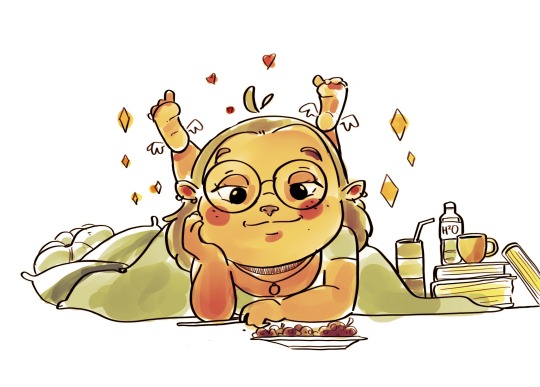
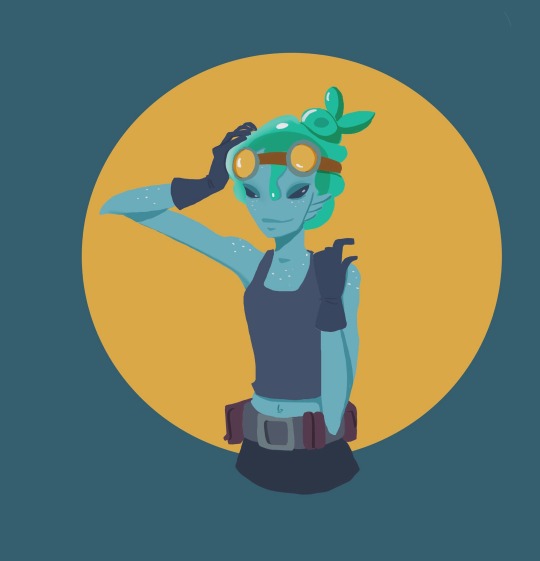

5 notes
·
View notes

